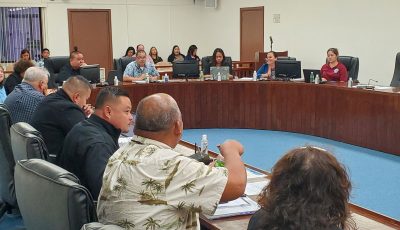PSS co-op program targets private businesses
A Public School System program that exposes students to work in the private sector is looking at having its students join the private sector this school year as a means for students to take up the slack in labor needs.
Speaking at yesterday’s meeting of the Society for Human Resource Management-NMI Chapter at the Charley’s Cabaret of the Pacific Islands Club Saipan, Brandon Nicholas, coordinator of the PSS Cooperative Education program, said the move is intended to help relieve the labor shortage that the CNMI’s private sector faces.
He acknowledged that the government sector does not have this problem and assured that the program fully supports the public sector and does not discourage students from pursuing employment in government.
However, also exposing students to job opportunities in the private sector widens their options and Nicholas encouraged businesses to sponsor the program as it provides an opportunity to train and later hire these students in the future.
In school year 2018-2019, a total of 561 students participated in the co-op program. The largest industries served on Saipan were hospitality and food & beverage, while Rota and Tinian’s largest industry served was in the retail industry.
A total of 61 companies participated in the co-op program last school year, with 55 from the private sector and six from the public sector.
Co-op Education is an elective class provided by PSS high schools and consists of two parts: cooperative education and cooperative training, with the former focusing on in-campus education of business ethic and job training, while the latter is primarily on-the-job training. The program is inclusive, meaning that students of PSS high schools are allowed to participate and all are allowed to take the co-op class. However, only juniors and seniors are allowed to participate in on-the-job training.
The requirements to join the cooperative training include:
• Students must be 16 and above for liability purposes;
• Students must maintain a 2.0 GPA;
• Students must have good attendance and have no disciplinary problems;
• Students must provide a social security number for stipend payments.
Through the program, students who work with the private sector will be able to receive three total stipends for one semester. They will be evaluated on performance appraisals, work-issued time cards, and other pertinent matters.
The training will be for a total of one semester and students are required to complete 60 training hours per month during the semester, which totals about three months. Scheduling will vary between the student and the hiring company.



























